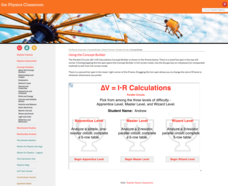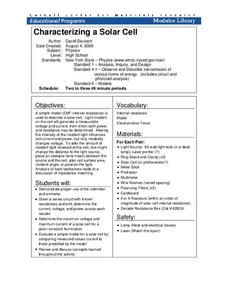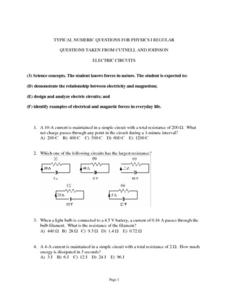Magic of Physics
Unit Converter I
Talk about a cool tool! Convert between units with the click of a mouse using a handy online resource. Enter the starting measurement and units for quantities such as torque, speed, and inertia, then sit back and relax while the computer...
Physics Classroom
Parallel Circuits - ∆V = I•R Calculations
Parallel circuits often provide less of a challenge for teens than parallel parking. An installment of a series on parallel electric circuits requires learners to solve increasingly difficult levels of calculations. Each level provides...
Physics Classroom
Series Circuits: ∆V=I•R Calculations
Better than some television series, parallel series circuits provide practice for calculations. Scholars work through a series of problems, each progressively more difficult. They apply knowledge of voltage calculations, resistors, and...
Physics Classroom
Ohm's Law: Voltage-Current-Resistance Relationship
Join the resistance—Ohm! Scholars apply Ohm's Law to problems of increasing difficulty as part of a series on electric circuits. The lesson begins with simply doubling and tripling voltage or resistance. It ends with having pupils solve...
Physics Classroom
Know Your Potential
Never underestimate potential—electric or your own. Scholars apply a color scheme based on the changes in electric potential as part of a series on electric circuits. They consider splitting wires, light bulb placement, and voltage as...
Physics Classroom
Resistance Ranking Tasks
Resistance is not futile ... it is voltage divided by current. Scholars apply their knowledge to a series of ranking puzzles. First, they consider wires of varying lengths and then wires of varying cross-sectional areas. Finally, they...
Facing History and Ourselves
Do You Take the Oath?
Why did so many go along with Nazi policies during World War II? An investigatory unit includes four handouts, reading analyses, classroom discussion topics, and intriguing philosophical questions, helping learners understand the...
Cornell University
Characterizing a Solar Cell
Young classes are sure to get a charge out of this lesson! Learners experiment with circuits of a solar cell. They practice determining current, voltage, and power for the circuit and maximize the voltage and current of the cell.
While They Watched
Teaching the Holocaust
What is the difference between prejudice and discrimination? Between collaborators and bystanders? Guilt and responsibility? Prompt learners to think critically about a very complex and textured topic with an innovative packet of materials.
CK-12 Foundation
Power Lines
How does electricity travel through power lines? The simulation demonstrates the how changes in voltage and resistance are related to the distance between power polls and the thickness of the cable. Scholars control three variables in...
CK-12 Foundation
Flashing Neon Light
How does a neon light work and does it actually contain the gas neon? An enlightening simulation encourages pupils to play with circuits and neon lights. They control the capacitance, resistance, and color of the bulb, and the simulation...
CK-12 Foundation
Flashlight
In a simple circuit, does electricity start instantly? A simulation encourages thinking about the flow of electrons at a microscopic level. Pupils control the voltage, resistance, and switch in order to observe the change in both ideal...
Columbus City Schools
It’s Electric!
Shocking! Who knew so many great ideas existed for teaching middle schoolers about electricity? Find them all within this energetic framework. You'll light up at the variety of printable and web-based resources within! After building...
LABScI
Circuits Lab: Lightbulbs
Electrons flow from negative to positive, but the general consensus is that current flows from positive to negative. Scholars explore current through construction of circuits in both series and parallel. The focus is on voltage,...
PHET
Resistance in a Wire
Resistance is not futile, it is voltage divided by current. A creative simulation presents a wire graphic and allows participants to alter the area, length, and resistivity. As scholars increase or decrease a variable within the...
Bowels Physics
Electric Circuits
Investigate the construction of the electric circuit with a thorough presentation that provides a solid background for each type of circuit. After introducing key vocabulary, the lesson goes on to explain circuit design.
Teach Engineering
Maximum Power Point
Investigate the maximum power output of a photovoltaic panel with a instructional activity that introduces the class to the maximum power point. Individuals learn how to determine the maximum power point of a solar panel by using Ohm's...
Virginia Department of Education
Adaptation and Evolution
Um may be the atomic symbol for confusion, but it won't be needed in this lesson. Scholars rotate through seven stations completing experiments, hands-on activities, writing exercises, and analysis. Stations include material on...
Teach Engineering
Pointing at Maximum Power for PV
Following detailed directions, teams collect the voltage and current outputs of a photovoltaic cell by adjusting the resistance. Using the collected data, they determine the highest power output. Implications for weather and a large...
Flipping Physics
AP Physics 1: Electricity Review
Are your scientists needing a review of the electricity concepts that will appear on the AP Physics test? This fast-paced video offers a comprehensive review of the topic. It also includes common misconceptions and test-taking tips.
Teach Engineering
Circuits
Don't know how to make the initial connection on electric circuits? This lesson provides the background to present the introductory vocabulary to learning about electric circuits. It is organized in a meaningful progression with an...
Ohio State University
Ohm's Law
Have you ever wanted to build a conductor? Here is a lesson that takes pupils through building a conductor based on Drude's model in order to better understand electricity.
Curated OER
Typical Numeric Questions for Physics I - Electric Circuits
A collection of 15 practice problems, most of them involving circuit schematics, is provided for your physics class on this handout. Learners are to compute the net charge, resistance, energy, or power dissipated for different...
Curated OER
Energy
Wow! Colorful and simple, these 160 slides introduce the various forms of energy, along with a relevant image. Some of the images are animations, which help beginning physical scientists to visualize the flow of electrons or energy! This...

























